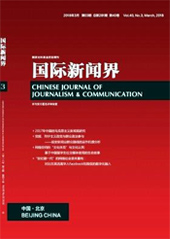News
The Construction of "Double First Class" |School of Journalism and Communication News Seminar No.31: Integration of live broadcasts and medi
Author: Time:2020-11-27The Construction of "Double First Class" |School of Journalism and Communication News Seminar No.31: Integration of live broadcasts and media: What has live broadcasting changed
On September 26, 2020, the General Offices of the Communist Party of China (CPC) Central Committee and the State Council released a guideline to further beef up the country's media convergence. In order to further concentrate on and explore the profound impact of live broadcast on media ecology and social development under the background of media integration, NO.31 Seminar, jointly sponsored by the School of Journalism and Communication of Renmin University of China and the School of Continuing Education of Renmin University of China and undertaken by the Audio-visual Communication Department of the School of Journalism and Communication of Renmin University of China, was held in the afternoon of November 13, 2020 at innovative incubation platform of media and smart communication integration.

The seminar invited experts, scholars, grassroots leading cadres, and webcast practitioners from the field of journalism and communication, and live broadcast. It focused on the theme of "what has live broadcast changed: integration of webcast and media" under the environment of media convergence, multiple technology empowerment, and interactive changes, emphasizing the influences and changes of audio visual communication and social development due to the socialization, integration and digital spiritual communication represented by "webcast", the impacts and inspirations formed in the multi-dimensional aspects of communication subject, communication structure, communication effect, industry attribute, social function and responsibility as well as the explanation of new phenomena and the answer to the new questions within academic observation and interdisciplinary vision in the face of the integration trend of multi-field in the network live broadcast and the changes of audio-visual communication form.
Address
Professor Zhou Yong, party secretary and vice president of School of Journalism and Communication and Communication, Renmin University of China

Secretary Zhou Yong expressed his welcome and thanks to the guests. He believed that media technology has profoundly changed the form of audio-visual communication. Three aspects reflect the current changes in the field of audio-visual communication.
First, social culture has turned to vision; now audio-visual has become the main form of information dissemination, cultural shaping, and civilization exchange.
Second, audio-visual is the focus of the current media development competition. At present, there are about 900 million Internet users in China using audio-visual information every day, which is undoubtedly the focus of the whole media industry competition.
Third, audio-visual is also a direction of the development of the whole emerging media technology. In recent years, most of the new technologies are audio-visual related. We are excited about this, but at the same time, with our sense of responsibility arises spontaneously, we need to consider what we can do for this industry.
"The Internet has its own independent logic. It's not enough to graft the basic theory of traditional news communication onto the term Internet," said Secretary Zhou Yong. "So we should take the Internet as the underlying logic to sort out the history and related theories of the Internet. Among the nine major disciplines of Renmin University of China, there is a direction of Internet journalism, and of which, audio-visual communication is the main participant. I look forward to the opinions of the guests and more exchanges and cooperation with you in the future. ".
Address
Liu Peng, Secretary of the Party Committee of School of Continuing Education, Renmin University of China

On behalf of the School of Continuing Education, secretary Liu Peng extended a warm welcome to the guests. He said, "in the second half of 2019, the School of Continuing Education and the expert team of the School of Journalism and Communication conducted in-depth research on the development status and trend of the field of webcast. At the same time, considering and integrating the advantages of economics, law, management and other disciplines of Renmin University, the School put forward the national new media webcasting talent training course. The course was launched to the whole society in May this year, which has received good social responses, and been recognized by relevant institutions of the Ministry of human resources and social security. The trainees participating in the training course can obtain two certificates issued by Renmin University of China and relevant institutions of the Ministry of human resources and social security respectively at the same time, which is our innovation. ".
He pointed out that the current seminar is just the new progress and achievements made by the School of Continuing Education and the School of Journalism and Communication on the basis of the previous cooperation. And he believed that the views and exchanges of all guests present would be of great help to the future development of the School of Continuing Education.
Topic 1: Opening Up New Field of Public Opinion
Peng Jianheng, Secretary of Discipline Inspection Commission of China Internet Network Information Center (CNNIC) and former deputy director of Internet public opinion center of Cyberspace Administration of China
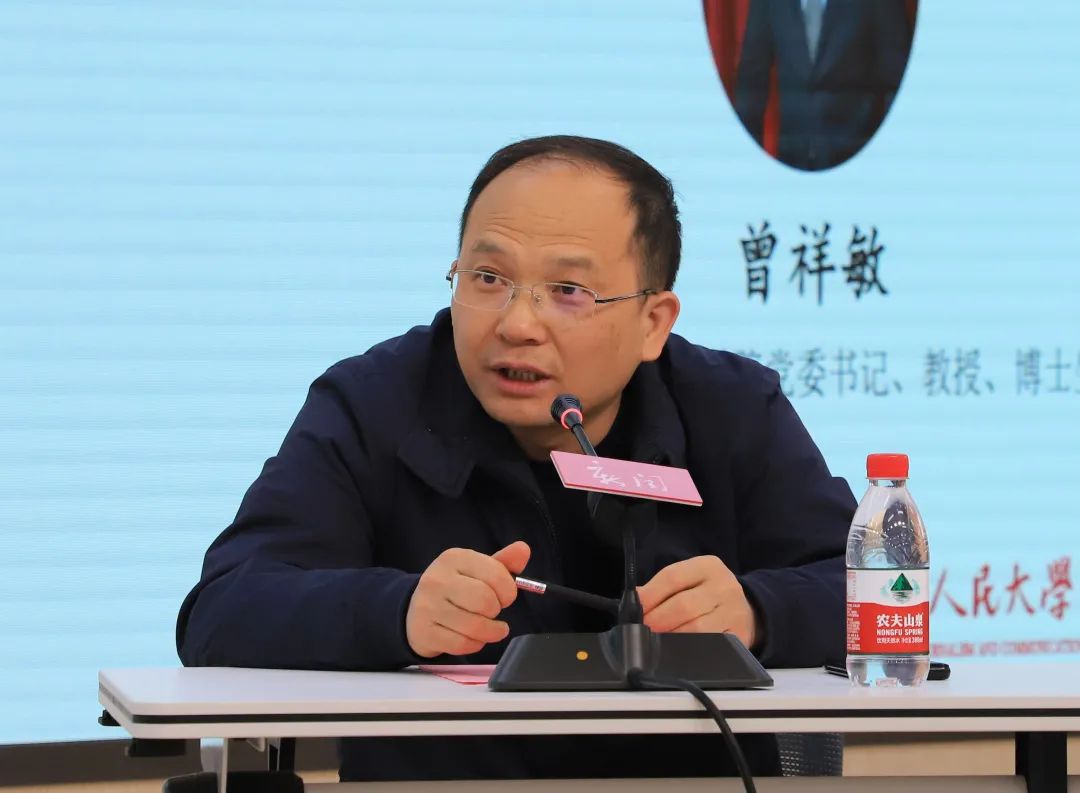
Secretary Peng Jianheng believed that the live broadcast is not fundamentally different from the previous internet publicity and internet communication, but there are still great differences in the form of expression:
"The management and control of live broadcasting is difficult because it is based on streaming media. There are plenty of live broadcasting platforms and rooms, which leads to high demand on supervision and the costs of technology and manpower," he said, "These bring great challenges to the aspects such as identification of the potential political and social risks in real-time live broadcasting, the immediate discovery, guidance and management of the negative effects, especially when the industry development is ahead of the technology research and development in present circumstance. In addition, we need to manage people instead of managing platforms as in old times. We need to highlight legal means, social autonomy, and the guidance of value, which is much harder than before and requires the coordination of many aspects."
"Of course, there are many benefits of live broadcasting, including in the aspects of transparency of government affairs, commerce, entertainment, culture and education. And among them, the most significant benefit is the commercial live broadcasting, which helps the development of the entire Internet industry, and also helps to publicize China's position, China's proposition and China's attitude.".
Professor Chen Changfeng, executive vice president of School of Journalism and Communication, Tsinghua University

Vice President Chen Changfeng believed that live broadcasting had taken great advantage of various characteristics of the second-generation Internet. For example, the era of Web2.0 emphasized personalization, interaction and sharing of information, which are fully reflected in the format of live broadcasting.
She said that from the perspective of public opinion, it could also bring some problems worth serious consideration: the opinion field is usually public, but the live broadcast is more personalized; the public opinion field is usually like a square, but the live broadcast is more a single room; in the past, the public opinion was onstage, but the live broadcast brought the mixture of onstage and backstage. The impact of live broadcasting on our original public opinion field is not only opening up but also reengineering, which will bring many new and complex problems.
Compared with TV, live broadcasting can lower the technical threshold, extend coverage, reach more scenes and provide more angles. Media spectacle and virtual space, perhaps in this era just can bring a particularly big impact. Live broadcast mobilizes more human organs and more perception, which enables us to achieve more comprehensive information.
Professor Zeng Xiangmin, Secretary of the Party committee of School of Television, Communication University of China
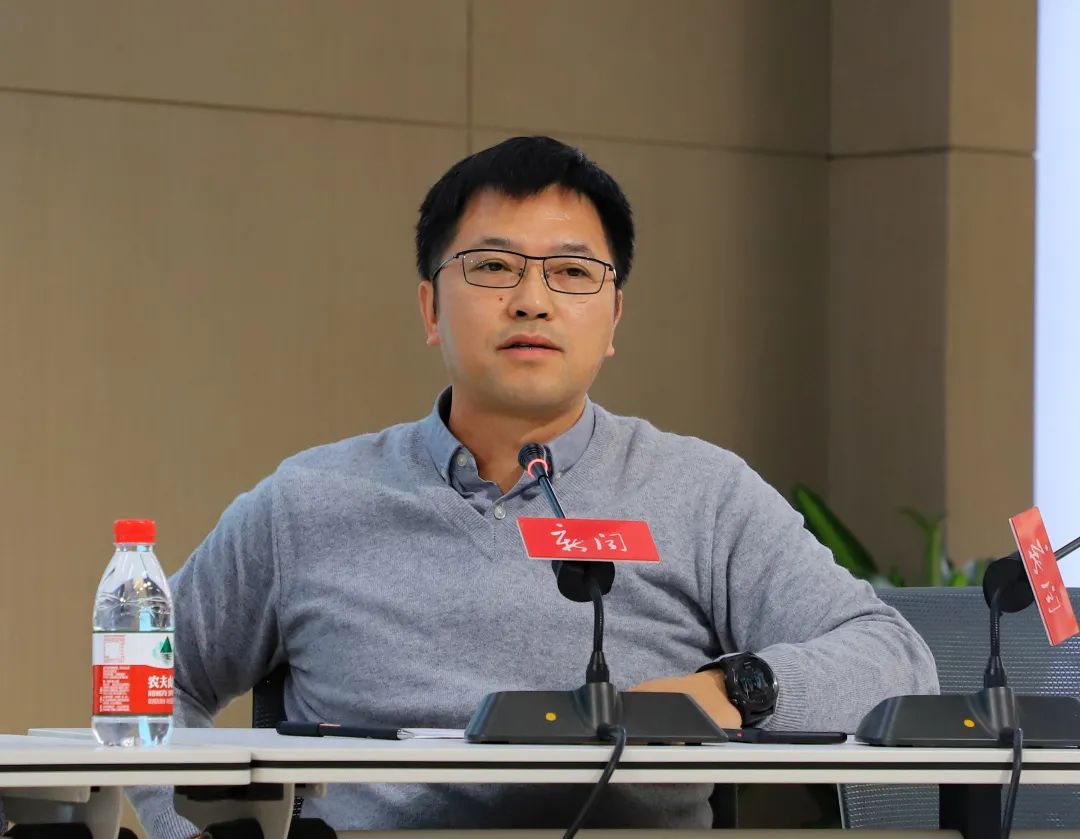
Secretary Zeng Xiangmin called mobile live broadcasting a visual real-time interactive public opinion field. He summarized the changes brought by live webcasting from three aspects:
First, it has changed the method of accessing information and services. It is not only satisfaction of information, but also of service and life, so it has also transferred the function of media from information media to value media.
Second, it changes the way we connect to the world. As far as users are concerned, webcast is a way for "post-95" (generation Z in the west) to connect with the world. They regard live broadcast, especially slow live broadcast, as a kind of social company. Users form an imaginary community to relieve their emotions, boredom and worries.
Third, it has changed the content ecology of media. It promotes the mainstream media to actively establish connection and interaction with users. In the live broadcast, comments are productivity, and onlookers can produce influence. The content generated by users has changed the content ecology of the media. "In today's open field of public opinion, we need to strengthen our ability to break through circles and integrate discourses. We also need to lower our posture, change our voice and innovate our forms to communicate with users." he said.
Topic 2: Building New Communication Ecology
Xia Jiang, deputy editor in chief of Beijing Kwai Technology Co., Ltd.
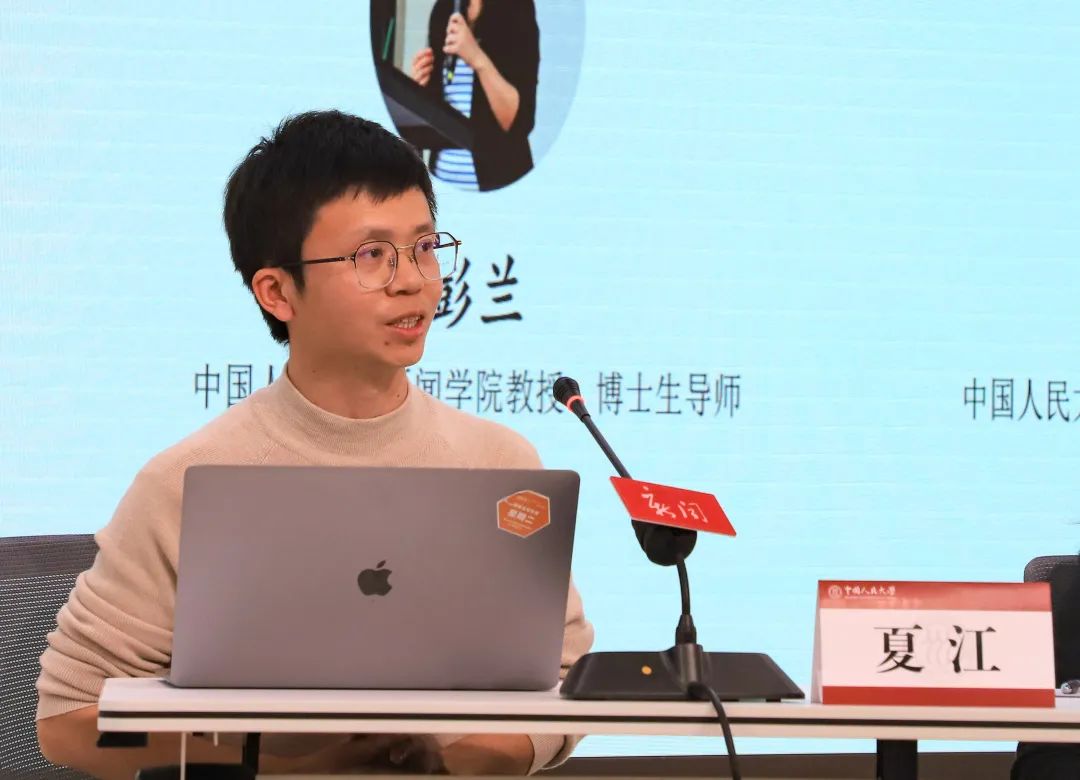
Deputy editor in chief Xia Jiang focused on media convergence on the basis of the case of Kwai Tai platform.
He firstly introduced the case of National Day parade in which the "multi-link live technology" was used, "there were 7 signals in the live broadcast platform, the first signal was large screen signal, the other 6 signals were different angles of view. And we put it in a live room to do live interactive broadcast."
Xia Jiang also cited the media convergence cases of other institutions cooperate with Kwai, such as CCTV news broadcast historically cast in Kwai, the cooperation between Kwai and CCTV Spring Festival Gala. In addition, there are many media integration attempts and explorations that Kwai has made in institutions, people and modes.
He also raised many problems that Kwai encountered in the current media convergence practice, such as the urgent need to improve the MCN service ability, the reconstruction of the small screen discourse system and the adjustment of mentality.
Professor Wang Runze, deputy dean of School of Journalism and Communication, Renmin University of China
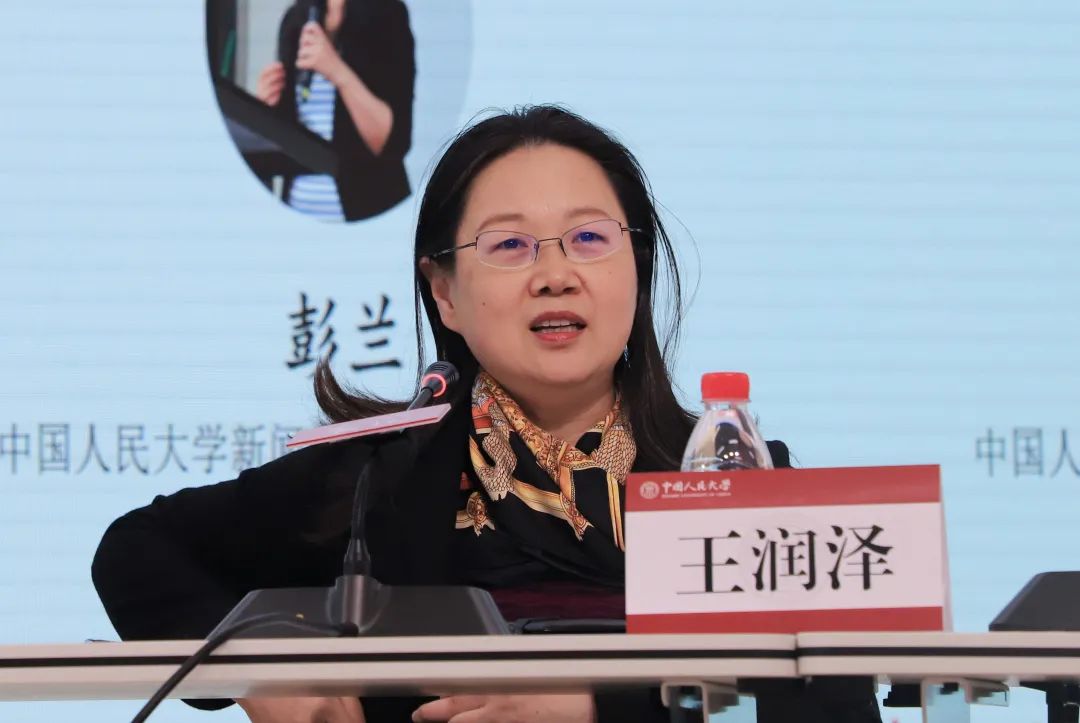
From the perspective of history, Professor Wang Runze focuses on three aspects: the concept and value extraction of communication ecology, affinity to the people, and the path of media success
"For the academic community, we have to do a very important work, which is to extract some common and conceptual things through the practice of the industry and the success of individuals and products. It’s very difficult, but it’s our responsibility." Professor Wang Runze believed that "the most important thing in ecology is the value chain. In the era of information products, how to extract the value elements from the personalized products and form the most important news value, information value and product value in the era of media convergence is our Chinese dream.
At the same time, from a historical perspective, she talked about the affinity of people and the path to media success, "why can the media of the Communist Party of China succeed? Because we are embracing those people who the Kuomintang government thought were poor and impoverished and who we viewed as the objects of study. From the perspective of history, new media is in the process of embracing those previously despised audience step by step. In fact, how much the media can succeed depend on much we can humble.
Professor Peng Lan, School of Journalism and Communication, Renmin University of China

Professor Peng Lan believed that we should look at the current communication ecology beyond the understanding and perspective of media people in the past. And the following aspects are important perspectives for us to understand the changes in communication ecology:
First, individuals. In the text-based expression space (such as blog, microblog), "I write, therefore I am" cannot be fully achieved, but in today's live and short video field, "I shoot, therefore I am" is possible. Video can enhance the individual's existence and discourse power, and also promote the realization of discourse power. Video blurs the boundary between our media and life. And we can also say that video is a very big driving force for the media of our daily life today.
Second, the media. Now the media is also pursuing a kind of "I shoot, therefore I am", because if it does not enter the field of video and live broadcasting, its presence among users will be reduced. On the one hand, the media should embrace new technologies and have a closer and more equal connection with users, but on the other hand, it should also maintain its professional value instead of completely abandoning the core and professional principles of the whole media ecology in order to pander to users and pursue web traffic.
Third, the industrial chain. In the era of mobile internet, live broadcasting provides a good opportunity to open up the industrial chain of Content + Social + Service or E-commerce. Live broadcasting can perfectly reflect the combination of the three.
Professor Zeng Zhihua, Broadcasting and Anchoring School, Communication University of China
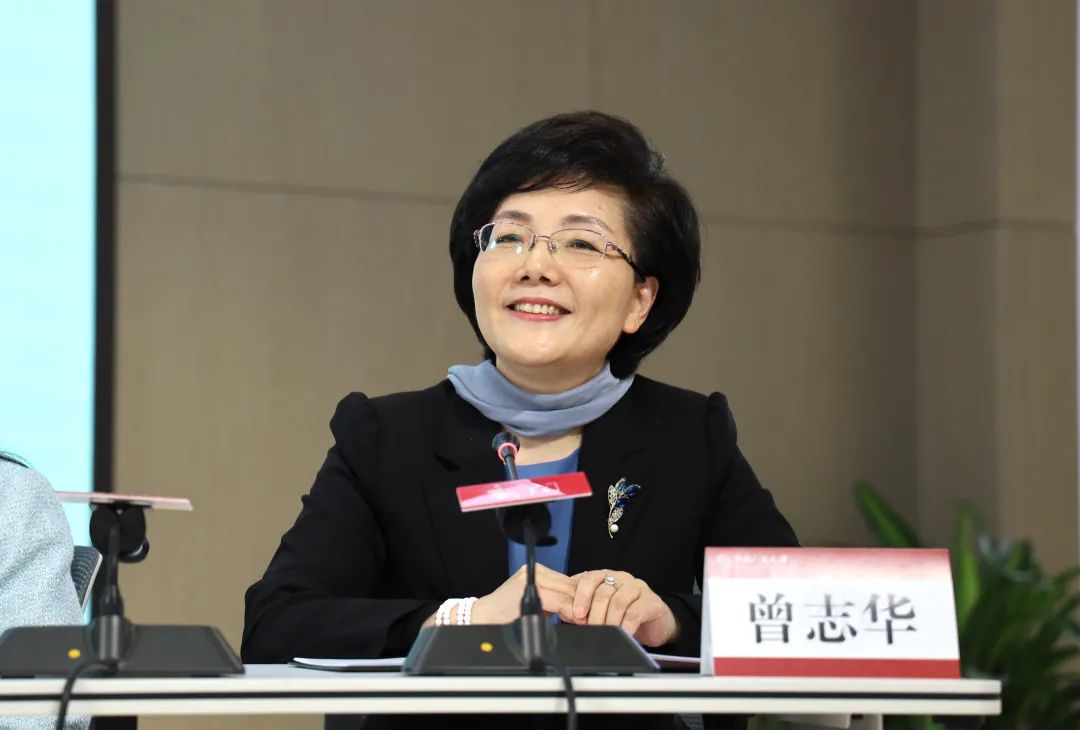
Professor Zeng Zhihua took "wolf" as the keyword and focused on three aspects of communication reconstruction from the micro-level of broadcasting host community.
First, "here comes the wolf.". Since the advent of the Internet in the 1990s, the traditional media has been faced with the problem of how to do it, which requires a lot of serious consideration while living in peace.
Second, "the wolf is really here.". Today, with the mobile Internet, everyone has a microphone, so the ownership of microphone and lens realizes the right to speak. The traditional media has stepped down from the top in the media ecology, and its influence and dominance cannot compare with itself before. The former "privileged niche" of announcer and host has been deconstructed from vertical niches to parallel niches and multiple niches.
Third, "who is the real wolf". Dancing with wolves is a word that insiders have said more in recent years. We have been emphasizing the embrace and integration of new technology and new media. But apart from integration, embrace, the professional value cannot be discarded. In the new communication ecology, we need to form a way of mutually beneficial and joint cooperation, so as to break through the niche overlap and find a way of their own ecological suitability.
Topic 3: Expanding New Social Impact
Shen Bo, director of Medical Department of Renmin Hospital of Wuhan University (Hubei General Hospital), chief physician
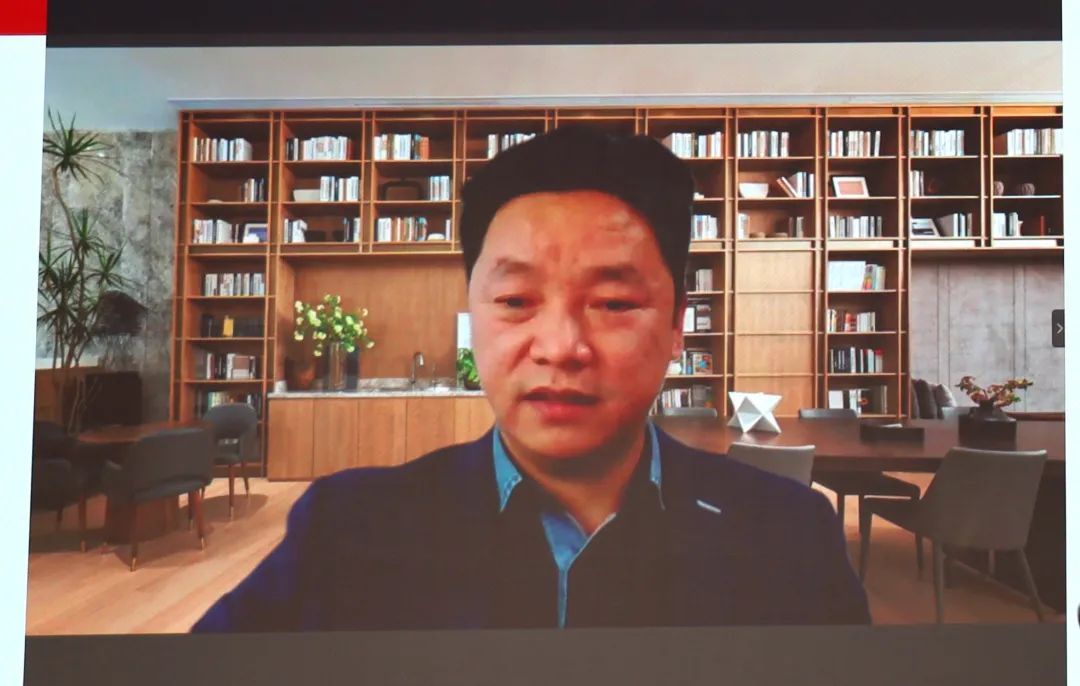
Director Shen Bo, shared the issue of how to combine the media and medical care in an organic way after introducing the efforts and practices of the people's Hospital of Hubei Provincial People's Hospital (Hubei Provincial People's Hospital) in fighting against the COVID-19.
First, set up a good platform. The media can play a very good role as a bridge between health care and the public. When there are real public health incidents, the authoritative and official media is essential to spread medical and health knowledge, promote health education, and tell the people what to pay attention to and how to deal with the problem.
Second, set up a good sign. Media live webcast can spread some medical related technologies, ideas and concepts to the public. Doctors and hospitals can also spread their own brands and expand their influence through the media. Now a lot of online influential doctors and medical health subjects have established brands through the media and spread medical and health knowledge.
Third, we should cultivate talents. In order to attract more young people to join the medical industry, we need the media to build a good platform and establish a good brand, so that these talents can make more contributions to the health of the whole country.
Xing Ge, senior editor of China Television Arts Committee

Senior editor Xing Ge shared the following three aspects: new changes in communication forms, new features of webcast, and laws of media communication
She believed that the progress of technology has brought about the expansion of freedom of communication. Webcast brings the real world of another scene to each of us and becomes a part of our virtual world which makes our life more vivid and enables everyone to express themselves and participate in the common life.
"As a new form of communication based on the Internet, webcast has changed the traditional way of transmission and reception. The forms of webcast and traditional radio and television live broadcast also coexist. The webcast is at the intersection of tradition and present, recording and broadcasting and live broadcasting. It has many characteristics, possibilities and development space. How to deeply explore the characteristics of webcast will be a direction we will focus on in the future.
At the same time, she pointed out that the new changes and new features of webcast may not necessarily promote the progress of the contemporary audience's understanding level, ideas and value judgment standards. Therefore, no matter how the form of media advances, "content is king" is a communication law that cannot be ignored.
Yan Mei, Secretary of the Party committee and teacher of the School of Journalism and Communication, Renmin University of China

Associate Professor Yan Mei puts forward two opinions about the phenomenon that webcast is integrated into social life.
First, pay more attention to the sense of experience. In the past, the scene is more just an environment, but in today's scene, professional experience is highlighted. Culture and experience become more and more prominent in the scene.
Second, the emotionalization of professional ability. Today, the balance between professional ability and emotion is important, as well as the resonance between emotions. The combination of emotion and professional ability can bring good communication effects.
At the same time, she made her own response and interpretation to the concept of "webcast + culture"
First, the involvement of culture in the live broadcast helps to improve the anchor's image. For example, the introduction of online celebrities and traffic stars in the live broadcast can not only enhance brand traffic with online celebrities and popular stars but also retain fans and users.
Second, the involvement of culture in the live broadcast helps to maintain the relationship and build the bond of trust. Especially for the medical industry, star doctors can attract more patients' attention and trust through “Brand + Technology” (such as 5g, VR, AR), so as to provide more services for patients.
He Tianping, postdoctoral in Sociology of Renmin University of China and researcher of Beijing Netcasting Service Association
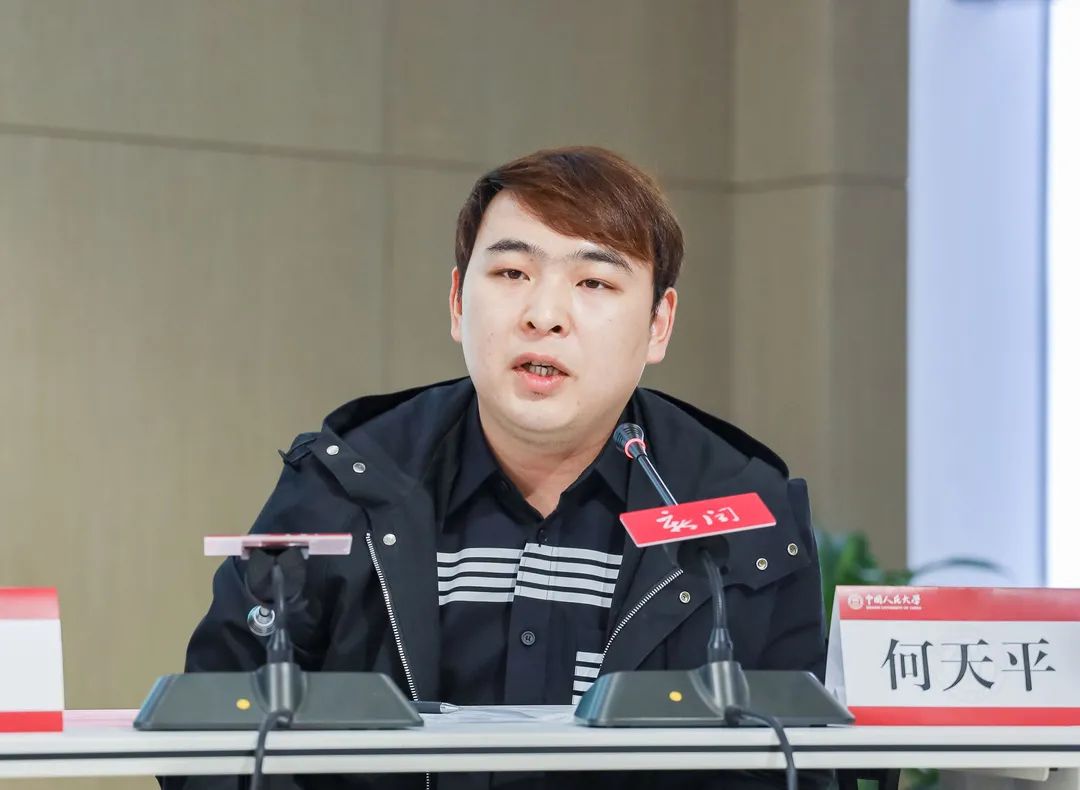
As for the reasons why many Internet Celebrities, such as entrepreneurs, officials, doctors and other multiple subjects have begun to participate in the live broadcast, researcher He Tianping pointed out that the live broadcast is like a state floating on our daily life, a builder of daily life experience and a new content generation platform for interpersonal communication. Therefore, webcast is reshaping the relationship scene. And the boundaries of the identities of various subjects are disappearing.
He also pointed out new changes of social roles and social situations in webcast.
"The original webcast may be a very individual situational thing, but today's webcast actually plays an important role in social integration and social mobilization, which leads to changes in social interaction. Due to the assumption and uncertainty of social roles in webcast, the social situation in webcast presents randomness, and all kinds of social roles that construct social situations are no longer clear and isolated. The assumed social role is no longer fixed but can flow and appear at any time."
Topic 4: Stimulating New Talent Demand
Well known network anchor Dai Nana

Based on her family's live webcasting experience and stories, Dai Nana focused on the multiple participants and wide influence of the live broadcast. "Many people think that the live broadcast is for young people, for the post-80s, post-90s and even post-00s. In fact, the impact of live broadcasting is very extensive and has penetrated into everyone's life. For example, many of our parents set up their own accounts for live broadcast, and also get health information and make friends with common interests through the process.
At the same time, she shared her personal experience of participating in a series of live broadcasts for poverty alleviation. "From 2016 to now, we have been to plenty of impoverished villages where we help them build a live broadcast platform system, teach them how to use the network platform and how to introduce their agricultural products to people outside their homes, their villages, even their townships County as well as how to build the local agricultural Internet.
Well known network anchor General Chen Ke
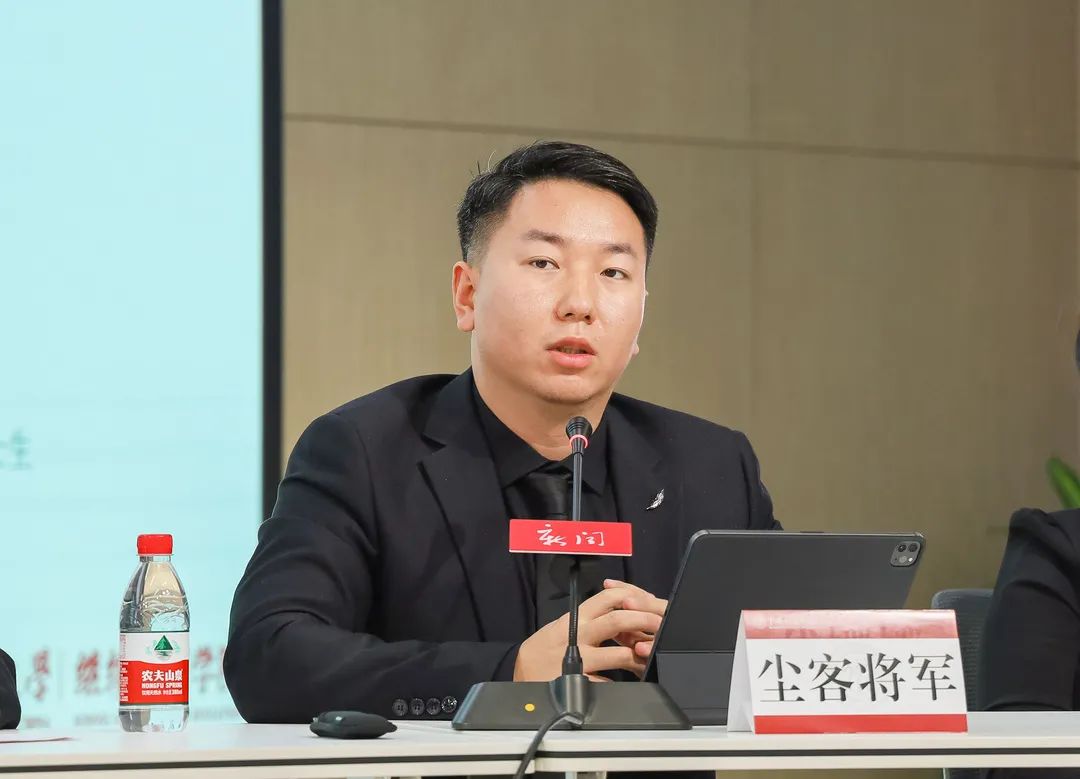
The anchor General Chen Ke shared his experience of persisting in live broadcasting of flag raising and lowering ceremony and carrying out public services,. He also explained his motivation and belief in doing live broadcasting and public welfare.
"I am an outdoor anchor on Kwai platform with about ten million fans, an anchor who keep broadcasting ceremony of raising and lowering the national flag in Tiananmen, Beijing and spreading the ceremony to the majority of users regardless of the weather. ".
He believed that the most important thing about live broadcasting is to be recognized by users and fans. "The more fans you have, the more responsibility you shoulder. Preserve your dignity as a nobody; promote the social welfare as a somebody. Recently, we went to Sichuan, Tibet and other poor areas to perform flag raising and lowering ceremonies. There are eight veterans in our team who have received the 70th anniversary of the National Day parade. We have no wages but hold a common belief. With the income accumulated on the network platform over the years, we have donated a lot of materials and funds to poor areas and 20 libraries to Daliang Mountain. And my purpose is to move and influence more people with my personal influence.
Zhao Ke, member of the Standing Committee of Chicheng County Party committee and deputy magistrate of Chicheng County, Hebei Province
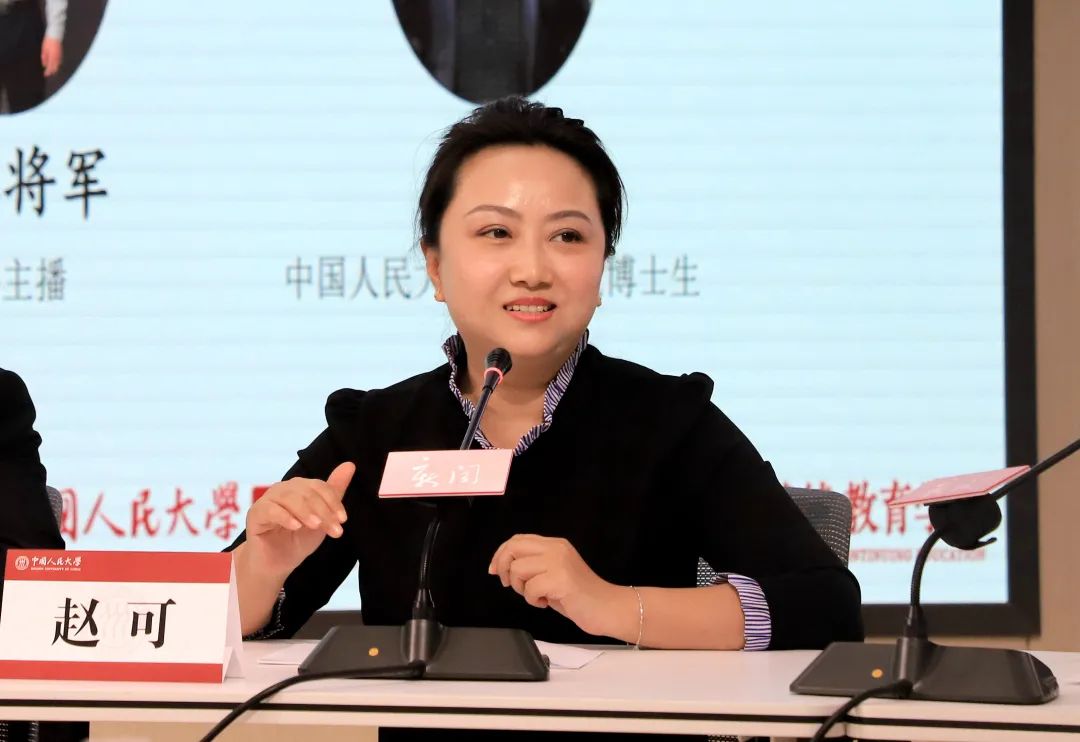
Deputy county magistrate Zhao Ke introduced his attempt and experience in carrying out live commerce during his temporary post in Chicheng County, Hebei Province. Chicheng has very good natural conditions and good agricultural products, but there are only few people know these. On June 18, we did the first live broadcast. At that time, our team was in the state of nothing (no staff, no equipment, no fans). But with live broadcasts, Chicheng has become more and more famous and has undergone great changes. ".
At the same time, she mentioned the importance of webcast for farmers to get rid of poverty. "Our consumption poverty alleviation quota this year is 510 million, and the joint efforts made online and offline have really played a great role in poverty alleviation and farmers."
In the future, she hopes to cultivate more people to use the microphone, the new farm tools so as to interact with netizens in front of the screen, to sell their own agricultural products, and to bring real changes to their life and economic income.
Wang Biao, PhD student, School of Journalism and Communication, Renmin University of China
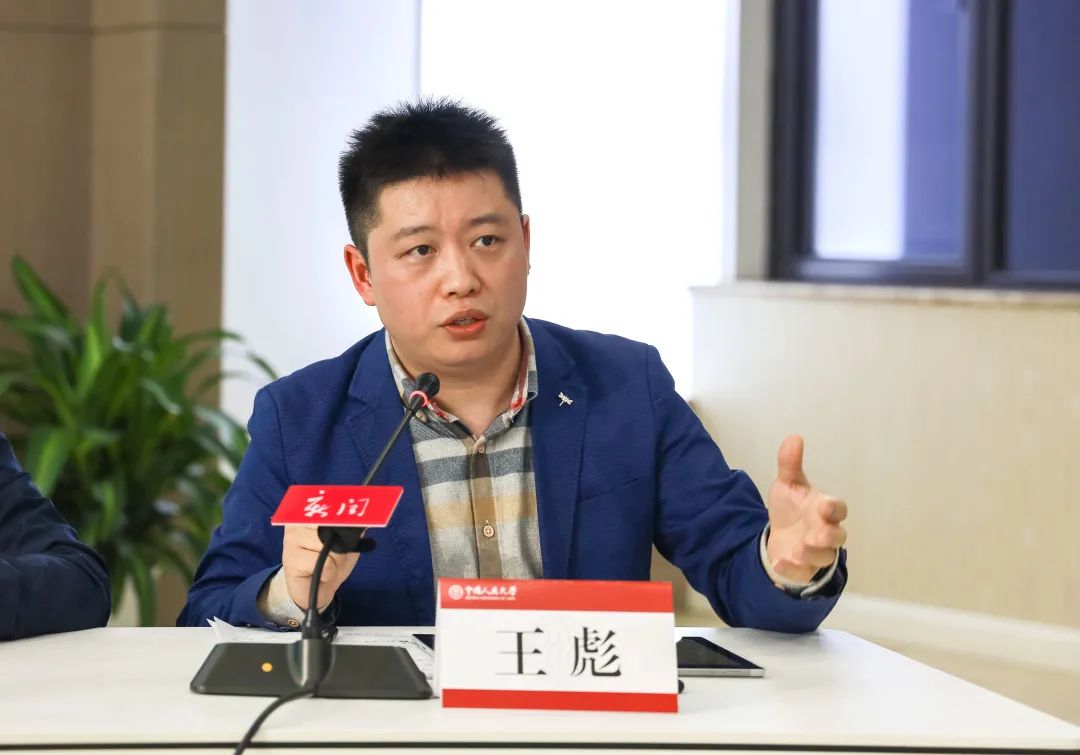
Wang Biao believed that in the era of live broadcast, "people" are at the center. He focused on the following three aspects:
First, the competitiveness of business is transformed into the competitiveness of individual brands.
The brand value of the livestream salesperson even exceeds the value of the goods. The credibility, personality appeal, image attraction and communication power of the goods carrier can be transformed into capital and influence the industries.
Second, the concept of talent began to change.
Most of the anchors today are talents cross media and fields. In fact, they integrate collecting, editing and broadcasting, and they also need to constantly collect and deal with the feedback from the audience. Crossing from the media industry to business, anchors not only responsible for broadcasting, but also responsible for commodity procurement, supply chain management and so on.
Third, the typification of talent types, audio-visual communication plus industry and specialization.
From the perspective of communication subject, it changes from one-way notification of mass communication to interpersonal two-way interaction with equal communication discourse, posture, modality and state. From the perspective of communication content, it is the transformation from professional knowledge to popular and symbolic language. From the perspective of the communication scene and process, it has now become a continuous and panoramic communication immersed in daily life.
Professor Gao Guiwu, director of audio-visual communication department, School of Journalism and Communication, Renmin University of China

Professor Gao Guiwu believed that today's webcast and anchors have become a phenomenon that cannot be ignored and had had great impacts on many industries.
He told the story of his experience and feelings after contacting with the anchors. "By chance, after I got to know the network anchor, I found that they had rich stories and experiences.? At present we need to explore what kind of specialty and ability lead them to this position that has such a great social impact.
He summed up the speeches of the guests and pointed out that they reflected some common things. For example, everyone mentioned that content is “the king”, and that the anchor or communicator should have public awareness or public responsibility. All these common things have strengthened his confidence in webcast.
At the same time, from the perspective of university teachers and researchers, he also shared some thoughts on future talent cultivation. "The phenomenon that everyone is an anchor has not fundamentally affected the university education. In terms of university education or higher education, what we cultivate is professionals who have civic literacy, public spirit, and can deal with people well in the field of communication to promote fluent communication.".
Host
Associate Professor Bu Chenguang, deputy secretary of the Party committee of the School of humanities and Social Sciences, Beijing Language and Culture University

As one of the ""Double First Class"" scientific research projects of journalism and communication discipline in Renmin University of China, the innovation seminar of academic discourse system of journalism and communication aims to focus on the key issues in the development of journalism and communication education and academic field. It integrates the wisdom of authoritative experts in relevant fields, making breakthroughs to promote the reform and innovation of teaching and scientific research in a certain field through discussions of each specific issue. Since 2018, the School of Journalism and Communication of Renmin University of China has continuously launched a series of small-scale seminars, each inviting experts and scholars to discuss a certain theme.


